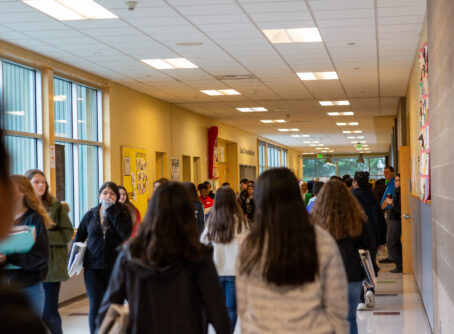
Food insecurity is rampant on college campuses. One in three college students are worried that their money will run out before it’s time to buy more food. Because of an inability to access typical forms of help for the food insecure (such as SNAP, or driving to a food pantry), college students are left without resources and government benefits. It is imperative that Christians come alongside struggling college students by providing them with a voice and advocating for policy changes that will help them be heard.
“Is it rent or is it food this week?” This was a question one of the students featured in a study conducted by Project Muse listed as something he regularly asks himself. Eating Top Ramen because of its 36-cent price tag is commonly seen as a right of passage for college students, but being unable to afford basic nutrition is more than a stereotype for the majority of American college students. Food insecurity, defined as the inability to maintain access to nutritional food consistently because of limited financial resources, affects hundreds of thousands of college students daily — and it doesn’t just mean students are going without a meal. Studies have found that almost every area of your life is impacted when you go hungry. Project Muse found that food insecurity led to physical, emotional, social, and academic barriers for students. I met with the coordinator of a food pantry at a 4-year, private university to hear her thoughts on food insecurity, and she used the analogy of a highway to describe what students are experiencing: “It’s like the universities are saying, ‘We’ve done our job, we’ve let you on to the highway,’ when the student is sitting there with a bike, or walking on foot. How do they expect students to succeed when they can’t even access their most basic needs?” “What I hear over and over again is that students just feel invisible,” she said.
While the federal government does not publish data on food insecurity among college students, a variety of private studies have found startling results, namely those conducted by The Hope Center for College, Community, and Justice (THC). In its 2020 study, THC found that 38% of students attending two-year colleges had experienced food insecurity in the 30 days prior to taking the survey, and nearly 1 in 3 students at four-year colleges reported having experienced food insecurity. The coordinator I spoke with said that most faculty at her college believe the food pantry only serves 50-100 students. In reality, it serves about 1,000, which is 5% of the school’s population. Focusing on doing well in classes is nearly impossible when students are “worried whether [their] food would run out before they could buy more,” as 44% of students surveyed reported feeling (THC).
What’s causing this?
A variety of factors contribute to food insecurity among college students, including rising tuition costs, the COVID-19 pandemic, and expensive meal plans; one of the most notable, however, is the lack of supportive resources. While some schools have food pantries, not all students have reliable transportation to the pantry or have the ability to prepare the food available to them. I stopped into my university’s food pantry and while there were a lot of great options available, the majority of items required a kitchen to prepare.
Additionally, other safety nets provided by the federal government are not as easily accessible to college students. Benefits like Earned Income Tax Credit (EITC) aren’t available to college students, and even when COVID-19-related temporary extensions were provided for young adults who did not have children living with them, the majority of college students either did not qualify or had a difficult time accessing the resources. Supplemental Nutrition Assistance Program (SNAP), the nation’s first line of defense against hunger, is increasingly difficult for college students to receive. Due to concerns that college students were taking advantage of SNAP benefits during the 1980s, Congress made full-time college students ineligible for SNAP benefits unless they work at least 20 hours per week or qualify for an exemption. If a student is working part-time, they are required to meet the work requirements for SNAP benefits and are eligible for only 3 months of SNAP benefits once every three years. Universities often tell college students to estimate two to three hours of homework per credit hour. That turns a typical student’s 15- or 18-hour class load into a 45- or 54-hour commitment. One of the primary benefits of college is the networking provided through other students and faculty. If students are filling up any extra time they have with working to feed themselves, they will not only suffer in school and socially, but will be deprived of receiving the most out of the college experience. With the expectation that students are going to professors’ office hours, applying for leadership positions in clubs and finding time to navigate adulthood, students are rarely left with enough time to commit to working 20-plus hours a week.
What does this mean for you?
While the blood of Jesus has extended grace to all believers no matter their actions, the Gospel compels us to give generously. In Luke 3:11, John the Baptist says “Whoever has two shirts should share with the person who doesn’t have any. Whoever has food should share it too.” It is estimated that 1 in 3 college students that you know are struggling with food insecurity. Asking how you can help is an excellent opportunity to exercise faith and be obedient to the call in 1 John 3:17-18: “Now, suppose a person has enough to live on and notices another believer in need. How can God’s love be in that person if he doesn’t bother to help the other believer? Dear children, we must show love through actions that are sincere, not through empty words.” Think of those in your life who might be facing food insecurity. Even if the only people that come to mind are individuals that you wouldn’t consider yourself close with, the Gospel of Christ has provided an excellent model of extending grace to all of us. Proverbs 25:21 states “If your enemy hungers, give him food to eat; and if he thirsts, give him water to drink.” Regardless of status, merit or reputation, the Bible encourages believers to take care of the needs of others, which includes college students who are in the midst of food insecurity.
With issues as complex as food insecurity, it can be tempting to label the problem as one that can only be addressed by elected officials. However, the CPJ Guidelines state that “The call to be a ‘neighbor’ — to help those who are in need — is addressed to all people and all institutions. Receiving assistance should enable those in need to reach or return to self-sufficiency and be in a position to help others.” This principle demonstrates that being a good neighbor is a call for every Christian regardless of occupation or season of life, and is an opportunity to be generous with the resources that God has blessed us with. While the government plays a crucial role in preventatively addressing poverty, it is only one player on the team necessary to combat food insecurity within the United States. There are several non-governmental organizations (NGOs) that are both more accessible and better able to address the needs of food insecurity in college students. These NGOs can help fill the gap left by government benefit programs that exclude college students and also promote self-sufficiency amongst the college students they come alongside. While many NGOs are focused on food insecurity more broadly, one way Christians can partner with these organizations on a small scale is by shining a light on the overlooked college students struggling with food insecurity and advocating for increasing the availability of NGO resources.
The myriad of groups working to fight college food insecurity provides a large number of options for Christians looking to serve. The easiest way to get involved in fighting food insecurity among college students is through volunteering at your local church food drive or on campus with a food pantry. If your community doesn’t have these resources, there are a variety of tools available that detail ways to start these programs. Additionally, a great way to contribute is by sharing information on college campuses to faculty, staff and students, so they know the resources available to students struggling with hunger.
Service often also takes the form of staying informed on policies, speaking up on systemic issues, and advocating for policy changes that would extend government resources to college students struggling with food insecurity. If your heart is to advocate for college students struggling with food insecurity, you can shine a light by bringing awareness to how on-campus housing and meal plan requirements contribute to student food insecurity and speaking out about the difficulties college students experience when trying to access government and NGO resources.
Whichever role you choose to play in this collective effort, remember that any impact you make can change lives. Deuteronomy 15:11 says, “Therefore I command you, ‘You shall open wide your hand to your brother, to the needy and to the poor, in your land.” Do not be discouraged that there is so much need. Be encouraged to be a part of the change.
Victoria Jones is a Senior at Baylor University who will be graduating in May of 2023 with a B.A. in Philosophy and a minor in Legal Reasoning and Analysis. This coming summer she is going to be interning with CPJ with plans of applying to law school in the fall to pursue public interest law.






